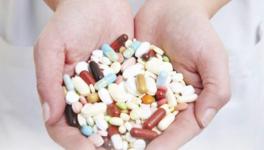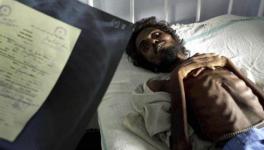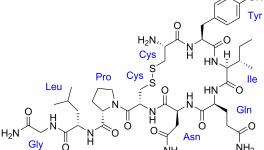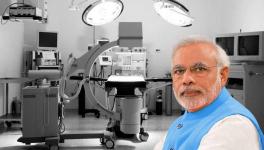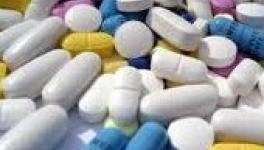Private Hospitals Making Profits Up To 1737%, Finds Study
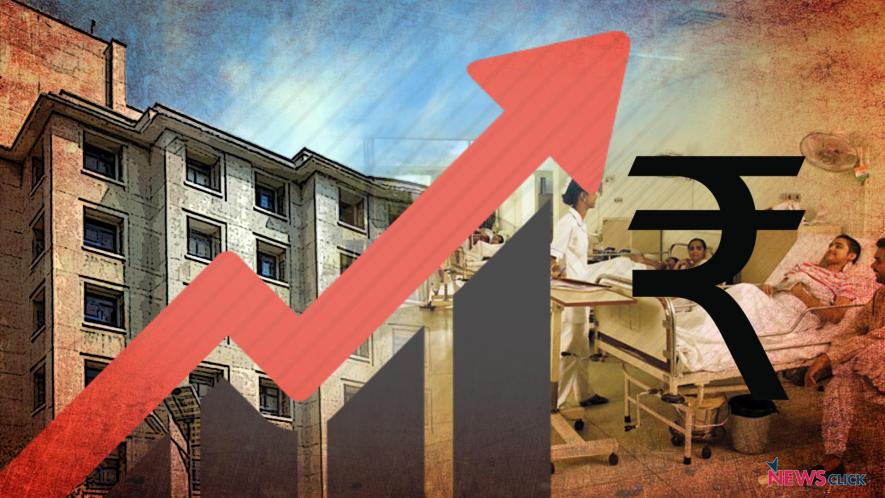
Newsclick Image by Sumit
A new study by the National Pharmaceutical Pricing Authority (NPPA) — which analysed the bills of four major private hospitals in Delhi and NCR — has found that the hospitals have been making profits up to 1,737% on drugs, consumables (like surgical masks, hand gloves, etc), medical devices and diagnostics.
In fact, the inflated prices of these make up around 46% of a patient’s bill.
The study was released on 20 February, and comes after cases of excessive pricing and unethical practices by private hospitals began making news in the past few months — especially after the case of 7-year-old Adya Singh, who died of dengue in September last year at Gurgaon’s Fortis Memorial Research Institute. For the 15 days that she spent at the hospital before her death, Fortis handed her parents a bill of Rs 16 lakh, which included the cost of 2,700 gloves and 660 syringes.
Although the names of the four hospitals were not revealed, Fortis is among the hospitals included in the study.
The NPPA found that, in order to claim higher profit margins, private hospitals are prescribing and dispensing “non-scheduled branded medicines” — drug variants that are not listed under the National List of Essential Medicines (NLEM) and therefore, not subject to price control — instead of the scheduled medicines under NLEM that are under price control, as per provisions of the Drug Prices Control Order (DPCO), 2013. The NLEM covers all essential medicines.
“The total cost on scheduled medicines used in the treatment is only 4.10% as compared to 25.67% on non-scheduled formulations,” the study said.
The NPPA said that, in the year 2017, the growth of non-NLEM drugs was almost double the rate of NLEM drugs, and that “this issue needs to be addressed through policy intervention.”
At a press conference organised by the All India Drug Action Network (AIDAN) on 22 February on the findings of the NPPA study, Dr Mira Shiva, co-convenor of AIDAN, said, “The NPPA findings that non-scheduled medicines make up around 25% of the combined bill costs is hardly surprising given that almost 90% of the pharmaceutical market remains outside price control. Hospitals are easily able to use this to their advantage by choosing to prescribe more expensive medicines. In its report, the NPPA has acknowledged that the market-based formula for fixing ceiling prices leaves room for huge trade margins.”
Shiva added, “The central flaw of the DPCO, 2013 is the deeply flawed market-based pricing mechanism that legitimizes profiteering and high prices. AIDAN has consistently advocated for expansion of the scope of the DPCO to cover all essential and life saving medicines and to reinstate a method of cost-based pricing that provides reasonable profits to companies.”
The NPPA study also revealed that the manufacturers of drugs and devices, in order to get bulk supply orders from private hospitals, are “in a way ‘forced’ to print higher MRPs as per the ‘market requirements’”.
“Institutional bulk purchase by private hospitals, which in most cases keep a pharmacy of its own, makes it easier for them to get very high profit margins and indulge into profiteering on drugs and devices even without need to violate the MRPs which is already enough inflated,” the study says.
The NPPA said this was a clear case of “market distortion”, where “manufacturers after accounting for their profits print inflated MRPs to meet out the demands of a distorted trade channel without getting any benefits from this 'artificial inflation'”. Indeed, as the study says, the main beneficiaries of profits in these cases of inflated MRPs are hospitals rather than the drugs’ and devices’ manufacturers themselves.
Apart from non-scheduled drugs, the charges on consumables are one-tenth of the total bills and more than two times of the expenditure on scheduled (essential) drugs, the NPPA said.
But it added that these consumables “are not under any kind of price control or monitoring of MRPs since these are not even listed as 'drugs' under Drugs & Cosmetics Act. NPPA can neither monitor the MRPs nor bring these disposables under price control even in public interest under extraordinary conditions.”
As for diagnostics services, they constitute more than 15% of the total cost.
“In random checks by NPPA, the charges were invariably found to be higher than diagnostics facilities provided by other independently run private centers”, said the NPPA.
However, again, it added that “diagnostics services along with all other charges by hospitals are beyond the purview of NPPA and the Central Government and can be regulated only through State specific laws whether through adoption of central model 'Clinical Establishment Act, 2010 and corresponding Rules' or otherwise through its own specific legislation by State Governments which is already in existence in every State requiring enabling statutory provisions.”
Moreover, the profit margins in the non-scheduled devices used in the cases of syringes, cannula and catheters were found to be “exorbitant and clearly a case of unethical profiteering in a failed market system.”
“The total expenditure on drugs and devices and diagnostics is substantially high (46%) and does not make part of the publicized 'estimate' or 'package' (in case of implants) by the hospitals in comparison to "procedures" (11.42%), room rent (11.61%) etc. which are the more visible components,” said the NPPA.
The authority said that patients had complained that the initial estimate of expenditure had got inflated by 3-4 times.
Also, a majority of the drugs, devices and disposables were used and sold by the hospitals from their own in-house pharmacies, found the study, adding that the patients were “given no choice or opportunity” to buy these items from outside the hospitals where prices tend to be lower in most cases.
Get the latest reports & analysis with people's perspective on Protests, movements & deep analytical videos, discussions of the current affairs in your Telegram app. Subscribe to NewsClick's Telegram channel & get Real-Time updates on stories, as they get published on our website.









